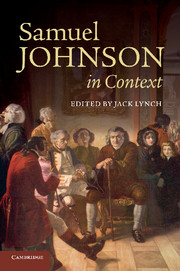Book contents
- Frontmatter
- Contents
- Illustrations
- Contributors
- Preface
- Chronology
- Abbreviations
- Part I Life and works
- Part II Critical fortunes
- Part III Contexts
- Chapter 10 America
- Chapter 11 Anglicanism
- Chapter 12 Anthropology
- Chapter 13 Authorship
- Chapter 14 Biography
- Chapter 15 Book trade
- Chapter 16 Clubs
- Chapter 17 Conversation
- Chapter 18 Dictionaries
- Chapter 19 Domestic life
- Chapter 20 Education
- Chapter 21 Empire
- Chapter 22 Essays
- Chapter 23 Fiction
- Chapter 24 History
- Chapter 25 Journalism
- Chapter 26 Law
- Chapter 27 Literary criticism
- Chapter 28 London
- Chapter 29 Medicine
- Chapter 30 Mental health
- Chapter 31 Money
- Chapter 32 Nationalism
- Chapter 33 Philosophy
- Chapter 34 Poetry
- Chapter 35 Politics
- Chapter 36 Scholarship
- Chapter 37 Science and technology
- Chapter 38 Scotland
- Chapter 39 Sermons
- Chapter 40 Shakespeare
- Chapter 41 Slavery and abolition
- Chapter 42 Social hierarchy
- Chapter 43 Theatre
- Chapter 44 Travel
- Chapter 45 Visual arts
- Chapter 46 War
- Chapter 47 Women writers
- Further reading
- Index
- References
Chapter 31 - Money
from Part III - Contexts
Published online by Cambridge University Press: 05 June 2012
- Frontmatter
- Contents
- Illustrations
- Contributors
- Preface
- Chronology
- Abbreviations
- Part I Life and works
- Part II Critical fortunes
- Part III Contexts
- Chapter 10 America
- Chapter 11 Anglicanism
- Chapter 12 Anthropology
- Chapter 13 Authorship
- Chapter 14 Biography
- Chapter 15 Book trade
- Chapter 16 Clubs
- Chapter 17 Conversation
- Chapter 18 Dictionaries
- Chapter 19 Domestic life
- Chapter 20 Education
- Chapter 21 Empire
- Chapter 22 Essays
- Chapter 23 Fiction
- Chapter 24 History
- Chapter 25 Journalism
- Chapter 26 Law
- Chapter 27 Literary criticism
- Chapter 28 London
- Chapter 29 Medicine
- Chapter 30 Mental health
- Chapter 31 Money
- Chapter 32 Nationalism
- Chapter 33 Philosophy
- Chapter 34 Poetry
- Chapter 35 Politics
- Chapter 36 Scholarship
- Chapter 37 Science and technology
- Chapter 38 Scotland
- Chapter 39 Sermons
- Chapter 40 Shakespeare
- Chapter 41 Slavery and abolition
- Chapter 42 Social hierarchy
- Chapter 43 Theatre
- Chapter 44 Travel
- Chapter 45 Visual arts
- Chapter 46 War
- Chapter 47 Women writers
- Further reading
- Index
- References
Summary
MO′NEY. n.s. [monnoye, French; moneta, Latin. It has properly no plural except when money is taken for a single piece; but monies was formerly used for sums.] Metal coined for the purposes of commerce.
Money differs from uncoined silver, in that the quantity of silver in each piece of money is ascertained by the stamp it bears, which is a publick voucher. Locke.
“The dearness of every thing,” wrote philosopher and historian David Hume, “from plenty of money, is a disadvantage, which attends to an established commerce, and sets bounds to it in every country, by enabling the poorer states to undersell the richer in all foreign markets.” New forms of money were prompting anxiety:
This had made me entertain a doubt concerning the benefit of banks and paper credit, which are so generally esteemed advantageous to every nation. That provisions and labour should become dear by the encrease of trade and money, is, in many respects, an inconvenience; but an inconvenience that is unavoidable, and the effect of that public wealth and prosperity which are the ends of all our wishes.
The monetary economy
Many of David Hume’s compatriots shared his skepticism of banks, paper money, and credit, though few identified them so strongly with inflation. Those antiquarians who concerned themselves with long-term price trends more often focused their attention on the debasement of the coinage. Hume was one of the few to notice the importance of “paper money” and credit to the growth of the eighteenth-century economy. While few contemporaries would disagree with the notion that they were living in an era of rapid economic and social change, the tendency of modern historians to emphasize that change rather than the continuities with earlier periods obscures the reality that many of the salient features of the eighteenth-century economy had roots that stretched back to the Middle Ages.
- Type
- Chapter
- Information
- Samuel Johnson in Context , pp. 268 - 277Publisher: Cambridge University PressPrint publication year: 2011



